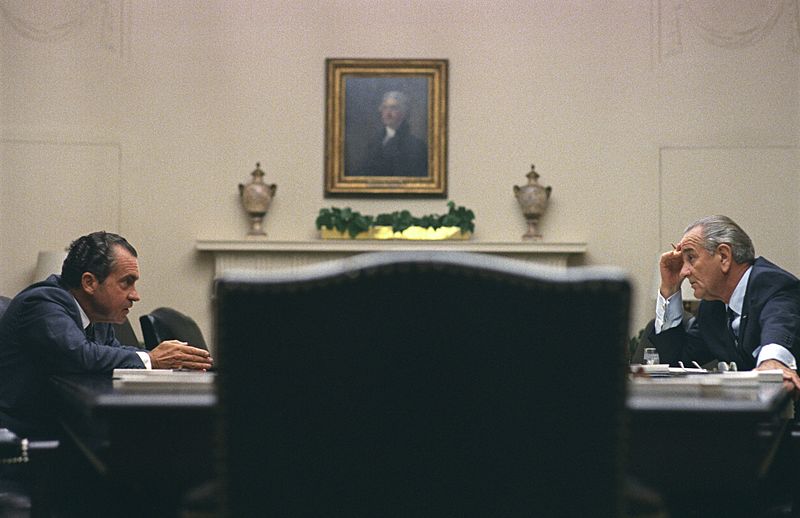When Jonathan Franzen, who’s not going to stop, met President Obama, he informed our Commander in Chief that Richard Nixon was the “last Liberal President.” Obama responded, “Yeah, the only problem was he was crazy.” Largely true on both counts.
I’ve mentioned before that Nixon, who succeeded LBJ and his “War on Poverty,” attempted to establish Guaranteed Basic Income in the U.S., which came awfully close to happening. For a number of reasons, technological and political among them, the idea probably has more currency among Liberal, Conservative and Libertarian think tanks than anytime since, though those vying for higher office, Bernie Sanders included, dare not speak its name. If GBI resulted in a total dismantling of all other social safety nets, it could do more harm than good. If done correctly, however, it could help working-class people survive the hollowing out of the middle.
At Alternet, Rutger Bregman recalls Nixon’s effort. An excerpt:
Few people today are aware that the United States was just a hair’s breadth from realizing a social safety net at least as extensive as those in most western European countries. When President Lyndon B. Johnson declared his “War on Poverty” in 1964, Democrats and Republicans alike rallied behind fundamental welfare reforms.
First, however, some trial runs were needed. Tens of millions of dollars were budgeted to provide a basic income for more than 8,500 Americans in New Jersey, Pennsylvania, Iowa, North Carolina, Indiana, Seattle and Denver in what were also the first-ever large-scale social experiments to distinguish experimental and control groups. The researchers wanted answers to three questions: (1) Would people work significantly less if they receive a guaranteed income? (2) Would the program be too expensive? (3) Would it prove politically unfeasible?
The answers were no, no and yes.
Declines in working hours were limited across the board. “[The] declines in hours of paid work were undoubtedly compensated in part by other useful activities, such as search for better jobs or work in the home,” noted the Seattle experiment’s concluding report. For example, one mother who had dropped out of high school worked less in order to earn a degree in psychology and get a job as a researcher. Another woman took acting classes; her husband began composing music. “We’re now self-sufficient, income-earning artists,” she told the researchers. Among youth included in the experiment, almost all the hours not spent on paid work went into more education. Among the New Jersey subjects, the rate of high school graduations rose 30 percent.
And thus, in August 1968, President Nixon presented a bill providing for a modest basic income, calling it “the most significant piece of social legislation in our nation’s history.” A White House poll found 90 percent of all newspapers enthusiastically receptive to the plan. The National Council of Churches was in favor, and so were the labor unions and even the corporate sector (see Brian Steensland’s book The Failed Welfare Resolution, page 69). At the White House, a telegram arrived declaring, “Two upper middle class Republicans who will pay for the program say bravo.” Pundits were even going around quoting Victor Hugo—“Nothing is stronger than an idea whose time has come.”
It seemed that the time for a basic income had well and truly arrived.•
Tags: Richard M. Nixon

